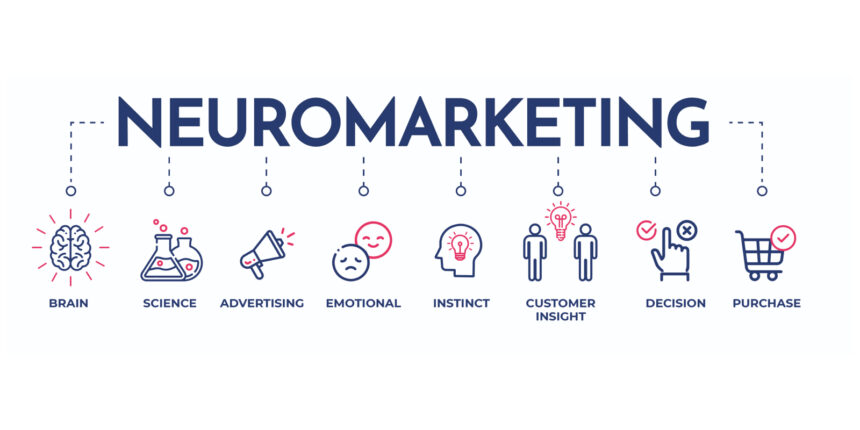Imagine walking down the grocery aisle, surrounded by a rainbow of products, each one vying for your attention.
What makes you reach for that shiny snack bag over another? That’s where neuro marketing comes into play—a fascinating blend of neuroscience and psychology designed to decode our decision-making processes.
As consumers, we often believe we’re making logical choices based on facts and figures. However, much of our behavior is driven by subconscious cues that brands expertly manipulate.
This blog post will take you on an insightful journey through the world of neuro marketing.
We’ll uncover how it works, explore its powerful influence on consumer behavior, and examine real-life campaigns that have successfully harnessed these strategies.
Plus, we’ll delve into the ethical concerns surrounding this emerging field and ponder what lies ahead for businesses and society as a whole.
Get ready to discover the compelling benefits of neuro marketing—it might just change the way you think about shopping forever!
Understanding Neuro Marketing and How it Works
Neuro marketing bridges the gap between neuroscience and consumer behavior. It analyzes how our brains respond to various stimuli in advertising, packaging, and branding. This approach goes beyond traditional market research by tapping into the subconscious.
Using techniques like eye tracking, EEGs, and fMRI scans, researchers can observe real-time brain activity. They identify which elements capture attention or trigger emotional responses. For instance, colors can evoke feelings of happiness or urgency, influencing purchasing choices.
Brands leverage these insights to craft messages that resonate more deeply with consumers. By understanding what drives decision-making at a neurological level, companies can create targeted campaigns that feel personal and relevant.
The result? A strategy that not only captures interest but also fosters brand loyalty through meaningful connections formed at an unconscious level. Neuro marketing transforms how businesses engage with their audiences in profound ways.
The Power of the Unconscious Mind in Decision Making
The unconscious mind plays a crucial role in how we make decisions. Often, it processes information without our awareness, influencing choices in ways we don’t fully understand.
Think about the last time you impulsively bought something. That urge likely stemmed from subconscious triggers rather than rational thought. Colors, sounds, and even scents can evoke emotions that guide purchasing behavior.
Neuro marketing taps into this power by appealing to these hidden drivers. Advertisements designed with specific imagery or music can activate positive feelings associated with a brand before consumers consciously realize it.
This subtle manipulation creates connections between products and emotional responses. As consumers become more aware of their motivations, understanding this dynamic becomes essential for marketers aiming to create meaningful engagement without crossing ethical boundaries. The brain’s silent workings continue to pave the way for innovative strategies in consumer engagement.
How Companies Use Neuro Marketing to Influence Consumer Behavior
Companies have become adept at harnessing the principles of neuro marketing to shape consumer choices. By tapping into emotional triggers, brands create experiences that resonate deeply with their audiences.
Visuals play a crucial role in this strategy. Captivating images and colors can evoke feelings before consumers even realize it. A well-placed logo or an eye-catching ad can command attention and linger in memory.
Sound also influences decisions. Brands use specific audio cues to build associations between products and positive emotions. Think about jingles that you can’t forget or background music designed to enhance your shopping experience.
Another tactic is storytelling, which engages the brain on multiple levels. Narratives allow consumers to connect personally with a brand’s message, making them more likely to choose one product over another.
Through clever combinations of these elements, companies effectively steer consumer behavior without overt persuasion techniques.
Real Life Examples of Successful Neuro Marketing Campaigns
Coca-Cola’s “Share a Coke” campaign is a standout example of neuro marketing in action. Instead of traditional branding, they used personalized labels featuring popular names. This clever strategy tapped into emotional connections and social sharing instincts, driving sales through consumer engagement.
Another case is Fanta’s use of vibrant colors and playful imagery in its advertising. By appealing to the senses, they effectively stimulated feelings of joy and nostalgia. These emotions ultimately influenced purchase decisions.
Nike also embraced neuro marketing with their “Just Do It” slogan. The phrase evokes determination and motivation, encouraging consumers to associate those traits with their products.
Apple’s minimalist design approach appeals directly to the subconscious preference for simplicity and elegance. Their advertisements focus on lifestyle rather than just product features, creating an aspirational image that resonates deeply with audiences.
The Ethical Debate Surrounding Neuro Marketing
The rise of neuro marketing has sparked a significant ethical debate. Many worry about its potential to manipulate consumer behavior on a subconscious level. This raises questions about free will and informed decision-making.
Critics argue that tapping into the unconscious mind could lead to exploitation. They contend that companies may exploit vulnerabilities, especially among children or less educated consumers who are not aware of these tactics.
On the other hand, proponents claim it can enhance advertising effectiveness without necessarily being harmful. They emphasize that using neuroscience insights can create more relevant experiences for consumers.
Finding balance is crucial. Ethical guidelines must be established to ensure responsible practices in neuro marketing while still allowing innovation in how brands connect with audiences. The conversation continues as society grapples with the implications of this powerful tool.
The Future of Neuro Marketing and Its Potential Impact on Society
The future of neuro marketing presents a fascinating landscape as technology continues to evolve. With advancements in brain imaging and data analysis, companies can gain deeper insights into consumer preferences and behaviors.
Imagine personalized advertising that responds not just to demographics but to real-time emotional states. This could lead to more meaningful connections between brands and consumers.
However, this power raises questions about privacy and manipulation. As marketers tap into the unconscious mind, the line between persuasion and coercion may blur. Society must grapple with these ethical implications.
Moreover, we may see an increase in responsible marketing practices as consumers become more aware of how their decisions are influenced. Education on neuro marketing techniques could empower individuals rather than leave them vulnerable.
As it stands, the potential impact is vast—both positive and negative—and it will require careful navigation by businesses, consumers, and regulators alike.
Conclusion: Embracing the Benefits of Neuro Marketing Responsibly
As we navigate the complexities of consumer behavior, embracing neuro marketing opens up a world of possibilities. It offers insights that can enhance brand strategies and foster deeper connections with customers. However, with this power comes responsibility.
Marketers must prioritize ethical considerations when employing neuro marketing techniques. Transparency is crucial; consumers should be informed about how their data is used and the strategies being implemented to influence their choices. Striking a balance between persuasion and respect for individual autonomy is essential.
The future holds great potential for neuro marketing to innovate how brands engage with consumers while maintaining trust. By leveraging neuroscience responsibly, businesses can create meaningful experiences that resonate on a psychological level without crossing ethical lines.
With careful application, neuro marketing can enrich both commercial success and consumer satisfaction in today’s dynamic marketplace. The key lies in using these powerful tools thoughtfully—creating pathways toward understanding rather than manipulation—and fostering relationships grounded in value and integrity.



